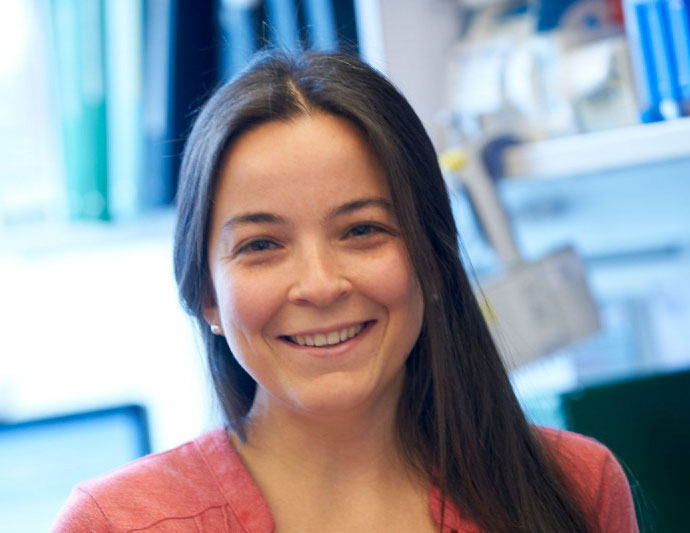Latest News
Research & Innovation, Center News & Funding
Massey researcher awarded $650,000 to study how immune cells affect the spread of breast cancer to the brain
Feb 21, 2019

VCU Massey Cancer Center researcher Paula Bos, Ph.D., was awarded $650,000 to investigate how a specific type of immune cell is integral to the growth and development of breast cancer cells that spread to the brain.
Through two separate grants, awarded by the Susan G. Komen Breast Cancer Foundation and the V Foundation for Cancer Research, Bos will study the impact of Treg cells upon breast cancer brain metastasis in an effort to develop effective treatment strategies that minimize serious side effects.
Regulatory T cells, or Treg cells, are a type of immune suppressive cell that are prevalent in both primary and metastatic breast tumors, and their presence is associated with poor patient outcomes.
Breast cancer is the most common type of cancer in women worldwide, and more than 12 percent of women will be diagnosed with the disease at some point during their lifetime, according to the National Cancer Institute. The 5-year-survival for localized female breast cancer is nearly 99 percent. However, once breast cancer has metastasized (spread) beyond the lymph nodes, that survival rate drops down to 27 percent.
“Metastatic disease is incurable and causes 90 percent of breast cancer-related deaths. Current treatments for breast cancer help patients live longer, but they are limited once the tumor has spread to the brain,” said Bos, a member of the Cancer Molecular Genetics research program at Massey and assistant professor of pathology at the VCU School of Medicine.
Bos was awarded $450,000 in funding through a Career Catalyst grant from the Susan G. Komen Breast Cancer Foundation over the course of three years to investigate how regulatory T cells support the outgrowth of breast cancer cells to the brain. In preclinical studies, Bos has previously demonstrated that removing Treg cells from breast cancer models with brain metastases reduced the size of the brain tumors. In this project, she will study the mechanisms by which that reduction happens, and explore combinatorial therapeutic strategies to treat established brain metastasis.
“Removing Treg cells in humans is not possible yet, and it could cause dangerous side effects,” Bos said. “Using this funding from Komen, I will study how Treg cells support brain metastasis in hopes of developing a treatment strategy that could be used in patients without creating harsh side effects.”
Additionally, Bos received $200,000 over a two-year span from the V Foundation for Cancer Research to study how Treg cells are involved in the transformation of brain tissue that allows for brain metastasis to occur. This research will use genetically engineered mouse models to examine how Treg cells control the changes that happen in the brain tissue microenvironment that precede breast cancer metastasis and facilitate the seeding of disseminated tumor cells.
“By learning more about how Treg cells contribute to brain tissue remodeling before metastases form, we hope to improve our chances of developing therapeutic strategies to prevent them,” Bos said.
Written by: Blake Belden
Related News
Research & Innovation
A portable water tank could make radiation therapy more efficient and accessibleAug 14, 2025
Research & Innovation
Commitment to cancer survivors paves the way for a healthier futureAug 13, 2025
Research & Innovation
Massey now offering outpatient transperineal prostate cancer biopsyAug 11, 2025

Get access to new, innovative care
Treatments in clinical trials may be more effective or have fewer side effects than the treatments that are currently available. With more than 200 studies for multiple types of cancers and cancer prevention, Massey supports a wide array of clinical trials.

Find a provider
Massey supports hundreds of top cancer specialists serving the needs of our patients. Massey’s medical team provides a wealth of expertise in cancer diagnosis, treatment, prevention and symptom management.
